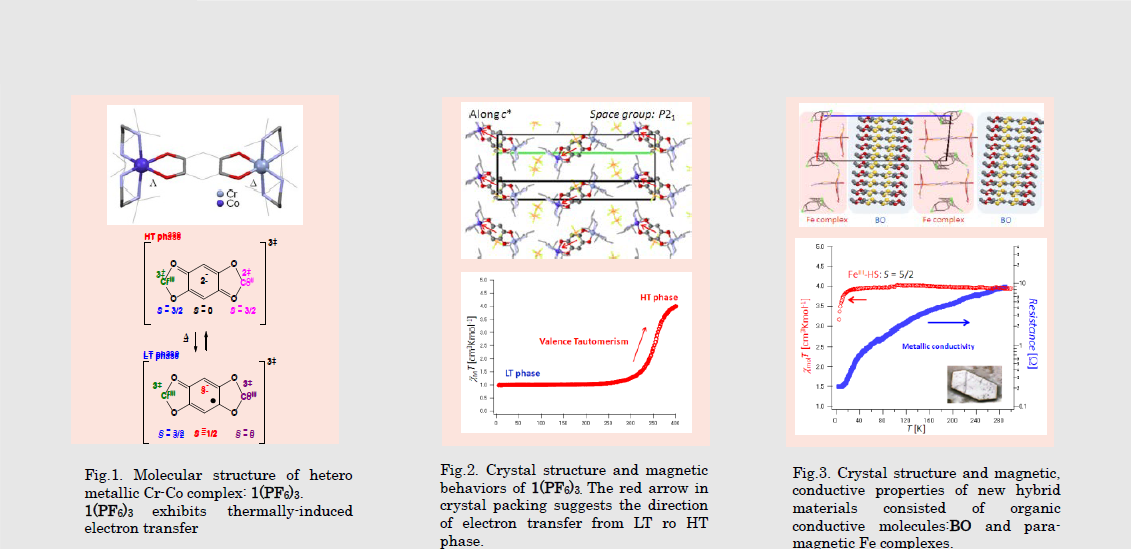
IMCE
Institute for Materials Chemistry and Engineering, Kyushu University
九州大学
先導物質化学研究所

LAST UPDATE 2017/02/25
-
研究者氏名
Researcher Name金川慎治 Shinji KANEGAWA
助教 Assistant Professor -
所属
Affiliation九州大学 先導物質化学研究所
物質基盤化学部門・分子物質化学分野
Institute for Materials Chemistry and Engineering, Kyushu University
Division of Fundamental Organic Chemistry, Molecular Materials Chemistry -
研究キーワード
Research Keywords分子磁性化学
複合的、動的物性
金属錯体
結晶構造制御
Molecular magnetism
Multi-, dynamic-physical properties
Metal complexes
Crystal structure control
- 研究テーマ
Research Subject -
動的な複合的電子物性変換を示す新規機能性錯体分子の開発
Development of New Functional Molecular Materials Exhibiting Dynamic Switching on Electronic Properties
研究の背景 Background of the Research
機能性分子の開発研究は基礎科学的な学術的興味にとどまらず、次世代の材料として非常に注目を集めています。既に無機酸化物などで見出され、実用に付されている機能材料は数多くありますが、分子性材料は「分子であること」を利用した柔軟な設計性や特徴的な物性の発現が期待できます。分子材料研究においては、単純にこれまでに既知の特性の数値的な改善ではなく、分子を起源とした質的に新しい物性を示す材料の開発が重要といえます。
The development of molecular-based functional materials is attracting much attention not only for fundamental interests but also for an application for new electric devices. Although Materials based on inorganic oxides has been came to practical use, molecular-based materials can be expected to exhibit characteristic properties, which come from ‘molecule’. It is important to develop new molecular –based function qualitatively in studies of molecular materials.
研究の目標 Research Objective
分子性材料の機能発現にはその構成単位となる分子そのものの設計に加え、結晶(固体)中での分子配列を併せて制御することが必要となる。このため、柔軟な分子設計による分子レベルでの電子状態制御に加え、キラリティ―といった有機分子の構造的な特徴による結晶構造制御をおこなうことで、新奇機能の発現を目指している。特に光や熱の外部刺激によって、磁性・導電性や誘電性が協同的に変換できる物質開発に注力している。
The molecular design and crystal design are both important to observe target properties in molecular materials. The electronic state of molecules can be controlled by molecular design. Additionally, crystal structure design is achieved by using chirality as a structural factor. The main target is development of stimuli-responsive multifunctional, which physical properties can be switched dynamically
研究図Figures

論文発表 / Publications
Eur. J. Inorg. Chem., 2013, 4150-4153. (2013), Eur. J. Inorg. Chem., 5-6, 725-729. (2013), Chem. Lett., 42, 700-702. (2013)
研究者連絡先 / HP
- kanegawa
 cm.kyushu-u.ac.jp
cm.kyushu-u.ac.jp - http://www.cm.kyushu-u.ac.jp/dv14/